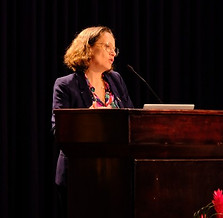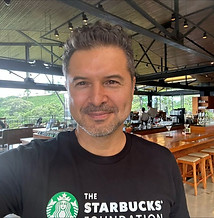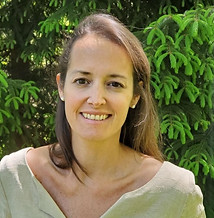Virtual Forum
Financing Sustainable Agriculture in the Americas
The Forum will take place over three consecutive days - August 12 to 14, 2025 - in virtual format. The virtual learning environment will be accessible, interactive, and collaborative. Broadcasts will be in high definition, with simultaneous translation (Spanish and English), and will feature functions for active audience participation, including moderated chat and question-and-answer sessions.
General objective
Promote high-level hemispheric dialogue on sustainable agricultural financing, positioning the FoHRSA mechanism as a strategic platform for coordinating concrete initiatives that strengthen the resilience and sustainability of agri-food systems, through the active and representative participation of key actors in the financial, agricultural, and climate ecosystems.
Specific objetives
1
Share experiences on the various sources of financing available for sustainable agriculture in the Americas
2
Identify solutions, opportunities, and challenges for mobilizing financial resources for agriculture
3
Promote the use of innovative financial instruments, such as blended finance, parametric agricultural insurance, or green bonds
4
Systematize recommendations and a roadmap to strengthen the financial architecture of sustainable agriculture in the face of new challenges of resilience and global competitiveness
Thematic approaches
Session 1: Sources of Institutional Financing
Strengthening sustainable agri-food systems in Latin America and the Caribbean requires mobilizing diversified financial resources, with philanthropic foundations and international cooperation agencies playing a central role. These institutional sources of financing not only provide capital, but also technical capabilities, governance frameworks, and long-term approaches aligned with the 2030 Agenda and global climate commitments. Foundations are moving towards strategic investment models that prioritize measurable impact, multi-stakeholder partnerships, and scalability, while cooperation agencies are increasingly integrating criteria of climate resilience, social inclusion, and institutional strengthening into their agricultural programs (FAO, 2022; ECLAC, 2023; OECD DAC, 2024). This session will explore how both actors can coordinate with governments, the private sector, and rural communities to catalyze systemic transformations in agriculture in the region.
Block 1: Foundation Funding
Philanthropic foundations represent a significant source of funding for sustainable agriculture, especially in contexts where public and private investment is limited. In Latin America and the Caribbean, these institutions have funded everything from food security and agroecology programs to social innovation models and rural capacity building. Foundations such as Rockefeller, Kellogg, and Packard have shown growing interest in supporting structural solutions in agriculture, including initiatives aimed at climate adaptation, the empowerment of rural women, and the digitization of the countryside (ECLAC, 2023; FAO, 2022; WINGS, 2023).
In recent years, philanthropy has shifted from a welfare-based approach to one focused on strategic impact, combining traditional donations with hybrid mechanisms such as venture philanthropy, programmatic investment, and multi-stakeholder partnerships. This approach allows for the leveraging of additional resources and amplifies the impact of funded interventions. However, the region faces structural barriers to connecting philanthropic offerings with the real needs of the territory, and still lacks effective platforms for co-investment with governments or the private sector (OECD NetFWD, 2022; IICA, 2023).
Block 2: Funding for Cooperation Agencies
Bilateral and multilateral cooperation agencies have been fundamental pillars of non-reimbursable public financing in agriculture in Latin America and the Caribbean. Through regional programs and national projects, they have channeled technical assistance, financial resources, and institutional support in key areas such as climate change, institutional strengthening, inclusive value chains, and restoration of productive ecosystems. Organizations such as the European Union, JICA, GIZ, AECID, and USAID have co-financed relevant programs in agroecology, agroforestry, capacity building, and emissions mitigation (ECLAC, 2023; FAO, 2022; OECD DAC, 2024).
However, access to these resources remains limited by technical barriers, lack of information, or weak project structuring. In addition, the priorities of donor agencies do not always coincide with national approaches, which hinders cooperation aligned with agricultural development strategies. Despite these challenges, agencies offer a unique opportunity to leverage climate funds, mobilize international expertise, and co-construct more inclusive financing models, especially in territories with high climate vulnerability (World Bank, 2023; IICA, 2024).
Session 2: Private and Impact Investment
The transition to sustainable food systems in Latin America and the Caribbean cannot be achieved without the active participation of private capital, particularly through impact investment vehicles, venture capital funds, and corporate financing models aligned with environmental and social objectives. The growing interest in investments with ESG (environmental, social, and governance) criteria has opened up opportunities to channel resources toward resilient, regenerative, and socially inclusive production models, especially in rural areas underserved by traditional banking (IDB, 2023; GSG, 2022). This session will address how private funds, impact investors, and large agri-food companies can articulate innovative financing solutions that combine profitability, impact, and sustainability, in line with climate commitments and the SDGs (World Bank, 2022; FAO & WBCSD, 2023).
Block 1: Impact Investing and Venture Capital
Impact investing and venture capital have established themselves as innovative mechanisms for financing transformations in food systems. Unlike traditional financing, these approaches integrate measurable social and environmental objectives alongside financial returns. In Latin America and the Caribbean, actors such as impact funds, family offices, social investment platforms, and venture capital are beginning to finance companies and projects linked to food sustainability, productive inclusion, ecological restoration, and climate adaptation (GSG, 2022; IDB, 2023).
However, the food systems investment ecosystem is still in its infancy and fragmented. There are few co-investment platforms focused on agriculture, and existing funds tend to concentrate on early stages or specific geographies. Likewise, many ventures with proven impact face difficulties in accessing financing in growth or consolidation stages. In this scenario, impact investments can play a catalytic role if combined with instruments such as guarantees, technical assistance, and blended finance (World Bank, 2023; IICA, 2024).
Block 2: Financing with the Private Sector
The private sector, especially large agribusiness and food companies, is taking a more active role in financing sustainable agricultural practices as part of their ESG commitments and adaptation to more demanding global markets. Many have begun to invest in their supply chains through contract farming schemes, certification programs, incentives for regenerative production, and supplier financing. This trend represents an opportunity to scale up sustainability from the demand side (FAO & WBCSD, 2023; World Bank, 2022).
However, the inclusion of small producers in these schemes faces significant challenges: lack of technical capacity, limited access to financial services, barriers to meeting standards, and commercial power asymmetries. Strengthening public-private partnerships with a territorial focus can facilitate coordination between companies, governments, cooperatives, and local communities. In addition, the use of fair contractual models and shared financing mechanisms can mitigate these imbalances and foster more equitable and sustainable relationships (ECLAC, 2023; IICA, 2024).
Session 3: International and Climate Finance
In the context of increasing climate variability, international and climate financing mechanisms have become a key driver of transformation in agri-food systems. Multilateral development banks such as the IDB, the World Bank, CAF, and CABEI channel resources on a large scale through loans, guarantees, and technical assistance, while global funds such as the GCF and GEF offer concessional instruments and grants aimed at adaptation, mitigation, and resilience in vulnerable sectors such as agriculture (ECLAC & CAF, 2023; GCF, 2024). However, Latin American and Caribbean countries still face significant obstacles in accessing and leveraging these resources due to technical complexity, institutional requirements, and limited project readiness. This session will analyze how to scale up access to these funds, improve the quality of agroclimate projects, and strengthen national capacities to structure ambitious, coherent, and transformative proposals (FAO, 2023; UNFCCC, 2023; IICA, 2024).
Block 1: Financing from Multilateral Development Banks
Multilateral Development Banks (MDBs) such as the Inter-American Development Bank (IDB), the World Bank, CAF, and CABEI play a strategic role in mobilizing financial and technical resources to transform agri-food systems. Through sovereign loans, credit lines, guarantees, technical assistance, and blended finance, these banks enable the financing of structural investments in rural infrastructure, agricultural technology, resilient value chains, and climate adaptation policies (ECLAC & CAF, 2023; World Bank, 2023).
These banks have robust capacities to structure large-scale projects, coordinate multi-stakeholder partnerships, and leverage private capital through risk mitigation instruments. However, their operational processes are often complex, which limits access to these funds for many countries and rural areas. Overcoming this barrier involves strengthening local formulation capacities, articulating regional pre-investment mechanisms, and adapting the financial frameworks of MDBs to the realities of agriculture (OECD, 2024; IICA, 2023).
Block 2: Climate Finance Funds
International climate funds—such as the Green Climate Fund (GCF), the Global Environment Facility (GEF), the Adaptation Fund, and other specialized mechanisms—have been created to support developing countries in their efforts to mitigate and adapt to climate change. Although in their early stages they focused on sectors such as energy and transport, these funds are now recognizing the strategic role of agriculture as a key sector for achieving transformative climate results (IPCC, 2023; GCF, 2024).
Latin America and the Caribbean have accessed only a limited fraction of the available resources, due to poor project preparation, lack of technical capacity in recipient countries, and complex fiduciary requirements. To overcome these barriers, regional project preparation platforms, results-based financing schemes, and partnerships with accredited entities are needed.
Agriculture can position itself as an eligible and strategic sector if it is linked to co-benefits of mitigation, food security, poverty reduction, and biodiversity (FAO, 2023; IICA, 2023). Agriculture can position itself as an eligible and strategic sector if it is linked to co-benefits of mitigation, food security, poverty reduction, and biodiversity (FAO, 2023; IICA, 2024).


























